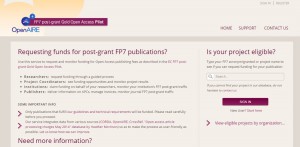Mafalda Picarra and Pablo de Castro, EC Open Access Pilot Coordinator, LIBER, provide an update of Jisc’s role in the OpenAIRE2020 project and detailed information on the recently launched pilot to fund Open Access publications for concluded FP7 projects.
Jisc and OpenAIRE2020
Since January 2015 Jisc has been participating in the EU-funded OpenAIRE2020 project and acting as the UK National Open Access Desk (NOAD). In this role, Jisc will inform HEIs, researchers and policymakers about the latest EU Open Access policy developments, compliance procedures and related infrastructure. Among other activities, Jisc will be providing information, guidance and resources to Horizon 2020 project coordinators and researchers, research libraries and research managers on:
- The Horizon 2020 Open Access policy and how to comply with the policy;
- The Open Research Data Pilot, the scope of the pilot and the data management plan;
- The FP7 Post-Grant Open Access Pilot features, technical requirements and funding request process.
OpenAIRE2020 and the FP7 Post-Grant Open Access Pilot
The European Commission has just launched a funding instrument to cover Open Access publishing fees: the FP7 Post-Grant Open Access Pilot. The pilot is being implemented under the OpenAIRE2020 project and funds will support OA publishing costs for finished FP7 projects. This funding comes on the top of other UK-specific funder initiatives that support OA publishing costs such as RCUK’s and COAF’s.
Eligibility Criteria
In contrast to RCUK’s and COAF’s initiatives, however, the EC’s funding policy is somewhat more restrictive. This is mainly due to the explicit wish that this funding initiative supports fully Open Access publishing but also due to the limited budget availability that will have to cover for FP7 post-grant publication costs across the whole EU Member States and neighbouring countries. Publications in hybrid journals will therefore not be funded. There will be a EUR 2,000 funding cap for APCs associated to research articles (and similar outputs) and a EUR 6,000 funding cap for monographs. On top of this, a maximum of 3 publications per project will be funded as an additional means for ensuring a balanced funding distribution across eligible FP7 projects. The FP7 post-grant OA Pilot policy guidelines, which include further technical requirements for publishers, are available at https://www.openaire.eu/goldoa/fp7-post-grant/pilot.
This is a post-grant project funding call, i.e. it aims to cover the publications expenses for projects that have already finished as this is when grant funds are no longer available. Eligible FP7 projects must therefore be nominally finished by the time an application for funding is submitted. Publications must, however, still be linked to the project’s activity therefore a two year eligibility time-window has been set to ensure this.
A central system for collecting and processing funding requests for eligible OA publications has recently been released where researchers (or their institutions on their behalf) will be able to provide the information on their FP7 project and the basic metadata for the publication whose APC funding they want to apply for. This central system requires registration and has been fitted with different user roles ranging from researcher to OpenAIRE moderator through institutional library, project coordinator, accounting officer or publisher.
Outreach & Implementation
With a rather restrictive set of eligibility criteria to provide funding for FP7 post-grant publications, an effective dissemination of the initiative towards eligible researchers and projects becomes a key aspect so that the funds are distributed fairly and in a transparent way. The FP7 post-grant OA Pilot is working closely with the OpenAIRE National Open Access Desks (NOADs) across the EU in order to ensure that best practices in the Pilot outreach and implementation are shared wherever they may take place.
The UK is a privileged testbed in this sense for exploring and producing such outreach best practices. The cross-institutional dissemination and management of previous APC funding initiatives has resulted in a set of collective working procedures that can effectively be re-used on this additional funding opportunity. Institutional webpages are often already available providing information on existing funding mechanisms for OA publications where the data for this additional funding policy can easily be added in. There is an increasing awareness too among UK-based researchers that they should contact their institutional libraries, research offices or Open Access funding services, before submitting their manuscripts to a publisher, to see if they may be eligible for APC funding. Agreed standards for APC reporting are arising as a result of the coordinated work of Jisc, of UK HEIs, of research funders, and of specific projects like Jisc Monitor.
All this should provide the basis for a very effective FP7 post-grant OA Pilot implementation in the UK. As an OpenAIRE2020 project partner collaborating in the FP7 post-grant OA Pilot and as the OpenAIRE NOAD for the UK, Jisc is working to ensure that the information on this initiative reaches the appropriate stakeholders and raises awareness among institutional services. The next key step is for Jisc to contact institutional Open Access units, libraries and research offices so that they can convey the information on the FP7 post-grant OA Pilot to eligible researchers and projects. Jisc will soon share with institutions the OA Pilot factsheets for researchers that are nearly complete. Institutions can also convey information on the Pilot to eligible researchers via their websites such as the examples already followed by the University of Glasgow, the University of Vienna and the University of Barcelona.
Contact
LIBER is coordinating the FP7 post-grant OA Pilot and hopes that the very effective way in which previous FP7 post-grant OA funding initiatives have been managed can serve as a basis to ensure that this additional funding opportunity is successfully exploited by eligible researchers and projects in the UK. Please feel free to contact Jisc and/or the Pilot coordination team in order to learn more about specific aspects not covered in the FP7 post-grant OA Pilot FAQs

